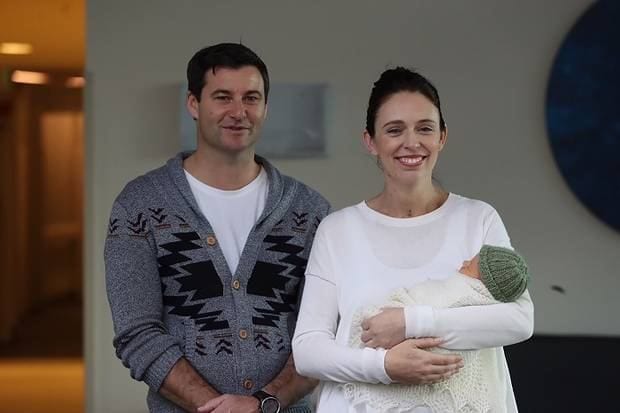By Jennifer Curtin –
[At at a conference of Speakers and Clerks from Australia and the Pacific Islands last week, Labour MP Kiri Allan argued for a change in the travel cap for partners of MPs with young babies, and the National Party pushed back on a ‘family-friendly’ proposal to allow MPs from the regions to leave early on Thursdays – “Mum MP calls for travel cap change to help politicians with babies“, NZ Herald, 10 July 2018]
Many New Zealanders might be feeling a little excited, and even just a little bit proud of the fact that we have a woman prime minister with a newborn baby. A few are busy trolling anyone on Twitter who dares congratulate Jacinda Ardern and her partner, Clarke Gayford, but for the most part, the arrival of Neve Te Aroha has been a moment warmly shared.
Becoming a parent while a parliamentarian is not in itself a new phenomenon. Five babies have been born to members of Parliament in the past year or so. Green MP and Associate Minister Julie Anne Genter is due to have her baby in August, 40 plus years after Whetu Tirikatene-Sullivan became the first woman to give birth while an MP.
Yet it is Ardern’s experience that is making world headlines, in part because she is only the second woman to have a baby while holding the office of PM. But it also coincides with a heightened international interest in gender politics.
The #MeToo movement has reinforced the reality that workplaces, including parliaments, are not always female-friendly environments. In response, Australia has just announced a national inquiry into workplace sexual harassment.
Alongside this, many countries in Europe are celebrating 100 years of women’s suffrage, but the commemorations have raised questions about the extent to which women’s access to political rights have resulted in rule changes to support their participation as members of the House and as mothers.
So could Ardern’s change of status lead us to rethink how our parliaments work? How might they become more accommodating of women politicians who want to be mothers, mothers who want to be politicians, and for all politicians who want to be present as parents?
Although New Zealand women gained the right to stand for Parliament 99 years ago, progress on this front has not been rapid. Tirikatene-Sullivan cared for her baby in her room in Parliament, and in 1983 a special breastfeeding room was arranged for Ruth Richardson.
Parliament set up a childcare centre in the 1990s for the children of MPs and staff. More recently, Ardern’s Government formally allowed babies into the debating chamber, and the lobbies next to the chamber have been made available for feeding.
However, there are yet to be clear guidelines established around access to parental leave. At present, MPs must get permission to take leave from the Speaker of the House to care for very young children, and they are not eligible for unpaid parental leave because by law all MPs must be paid. Sitting hours remain long, and the use of urgency requires considerable organisation on the care-giving front.
Last year, the Standing Orders Committee noted pressures on families were inherent to being an elected member, but expressed a desire to see a more family friendly Parliament. Ultimately the committee did not offer any recommendations, noting instead the Clerk of the House would have further conversations with members about how best to further accommodate family needs.
An evaluation of the UK House of Commons by Professor Sarah Childs, who will be visiting the University of Auckland’s public policy institute in early August, reminds us parliamentary working practices often continue to reflect the traditions and preferences of its historical residents, largely men. New rules and norms are required to address such things as sitting hours and vote requirements, who counts as a “stranger” in and around the chamber, as well as accessibility to parental leave.
Guided by criteria set out by the Inter-Parliamentary Union, Childs’ Good Parliament Report produced 43 detailed recommendations necessary to produce equality of participation, to support the work of MPs when sitting, and to reshape legislature culture to be more inclusive.
This could include voting remotely from one’s parliamentary office rather than rushing to a division, or to end evening sittings and embrace regular hours so that there are more opportunities for a work-family-life balance.
Childs argues insufficient support for parliamentary parents is likely to “skew the supply pool of candidates in favour of those who follow a more traditional family model or who have independent means”.
When Childs presented her conclusions to the Commons in 2016, she argued the 2018 centenary of women’s suffrage and the right to stand as candidates represented a significant opportunity to make change and become a “gold standard” inclusive Parliament.
New Zealand now has its own opportunity to take up the challenge of further reforming its parliamentary practices. Although we have proportional representation we have never achieved 40 per cent women MPs.
Women tend to enter politics later in life than their male counterparts, usually to accommodate parenting responsibilities. We don’t know if women are deterred by the demands of the legislative schedule. But now we have a Prime Minister who is a new mother, and in 2019 we will be celebrating the centenary of women’s right to stand for Parliament.
It’s the perfect time to undertake a gender audit of our parliamentary practices, with parenthood and diversity in mind, and build our own Good Parliament.
* Republished with permission from The New Zealand Herald. Originally published 28 June 2018
*Cover photo: Greg Bowker
• Professor Jennifer Curtin is director of the Public Policy Institute at the University of Auckland. Professor Sarah Childs of Birkbeck University, London, will be giving a public lecture titled, From Iron Lady to Kitten Heels, the gendered leadership of Theresa May, on August 2.


